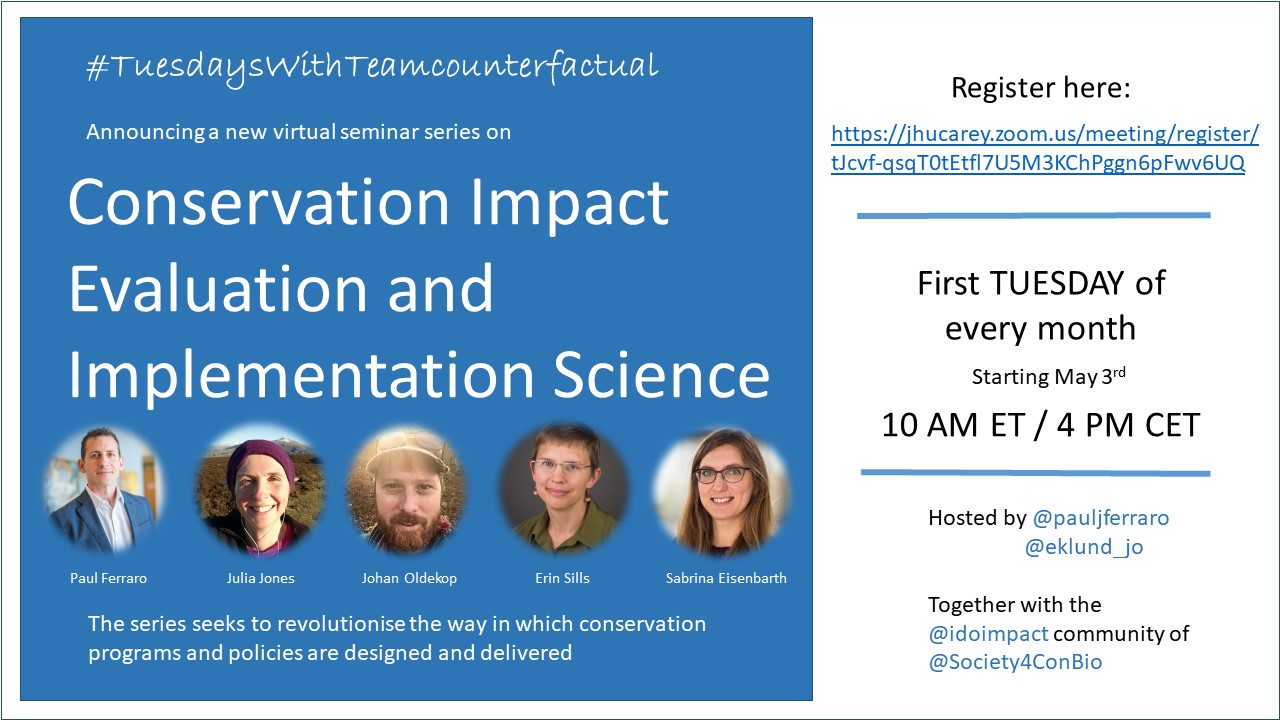
#TuesdaysWithTeamcounterfactual
Announcing a new virtual seminar series on “Conservation Impact Evaluation and Implementation Science”, hosted by Sebastien Costedoat, Rachel Martin and Sheila Reddy in coordination with the Impact Evaluation Working Group of the Society for Conservation Biology!
Register here and watch the past talks on our Vimeo or YouTube channel.

The series seeks to revolutionise the way in which conservation programs and policies are designed and delivered. The seminars are targeted at a broad audience - no previous experience necessary!
Upcoming Talk:
The virtual seminar series is being held on Zoom. Please register following the instructions below, and we'll be able to keep you updated on our #TuesdaysWithTeamcounterfactual series and send you instructions and reminders for each seminar.
Please note: you only need to register once, and we will keep you updated about all the seminars in the series. Once you have registered, we'll send out the Zoom login details and a calendar invite, plus monthly reminders. You can also catch up on all the previous recordings via Society for Conservation Biology’s Vimeo channel for the #TuesdaysWithTeamcounterfactual series.
Past Talks:
2026
- 3 February: Jan Börner, Institute for Food and Resource Economics, Center for Development Research, University of Bonn, Germany, Impact evaluation at borders and other spatial discontinuities: what we can learn and what not
2025
- November: Nick Salafsky, The role of "Gold-Standard" vs "Aluminium Standard" Impact Assessments in Conservation Practice
- 7 October: Ben Groom, Dragon Capital Chair of Biodiversity Economics, University of Exeter, The Impact of Overlapping Environmental Policies in Tropical Rainforests
- 6 May: Gonzalo Pons, Climate and Environment Program for Innovations for Poverty Action, Discovering and Advancing What Works: IPA's Approach and its new Climate and Environment Program
- 1 April: Tom White, University of Oxford and the Biodiversity Consultancy, Show me the money! Understanding and improving the cost-effectiveness of biodiversity conservation
- 4 March: Juliano J. Assunção, CPI/PUC-Rio, Carbon Prices and Forest Preservation Over Space and Time in the Brazilian Amazon
- 4 February: David Gill, Duke University, Is impact evaluation possible in data-poor contexts?
2024
- 3 December: Alex Pfaff, Duke University, Monique Borgerhoff Mulder, UC Davis, Rebecca Young, Durrell Wildlife Conservation Trust, Diogo Veríssimo, University of Oxford, Conservation Science and Practice:Special Issue on Bridging the Impact Evaluation Research-Practice Gap in Conservation
- 5 November: Rachel Neugarten, Executive Director, Conservation Planning, Wildlife Conservation Society, PhD to Practitioner: Practical approaches to impact evaluation – lessons from Madagascar and beyond
- 1 October: Daniela Miteva, Community sawmills save forests: Forest regrowth and avoided degradation due to vertical integration of wood production in Mexican community forests
- 3 September: Jonah Busch, What drives and stops deforestation, reforestation, and forest degradation? An updated meta-analysis
- 7 May: Caterina Cosmopolis, Sebastien Costedoat, Johanna Eklund, Tanya O'Garra, Edwin Pynegar, Rachel Martin, The Past, Present, and Future of the Impact Evaluation Working Group
- 2 April: Dr. Sheila Reddy, Global Director and Lead Scientist, Conservation Impact (The Nature Conservancy), Lessons learned for nature conservation: a perspective from 15 years of research and practice at a global conservation organization
- 5 Mar: Joseph Kiesecker, PhD (The Nature Conservancy), Enduring Earth is an ambitious conservation strategy and will require an equally ambitious MEL framework
2023
- 7 Feb: Jennifer Alix-Garcia (Oregon State University), Measurement error in satellite data and its effects on impact evaluations in conservation
- 7 March: Moderated Panel from Academia and Practice: "Counterfactual methods and their use in the voluntary forest carbon market: past, present and future" Thales West (Vrije Universiteit Amsterdam), Julianne (Julie) Baroody (Verra), Thomas Swinfield (University of Cambridge and 4C), and Carlos Silva (Pachama).
- 4 April: Jennifer Zavaleta Cheek (South Dakota State University) and Gabby Salazar (University of Florida), Theory-based Approaches to Impact Evaluation
- 2 May: Luke Sanford (Yale School of the Environment), Machine Learning for Impact Evaluation: Environmental effects of land tenure formalization
- 5 Sept: Robert Heilmayr (UC Santa Barbara), Conservation Impact Evaluation Using Remotely Sensed Data
- 3 Oct: Michael Mascia (Duke University), Solving the Mystery of Marine Protected Areas performance: Long-term monitoring systems and impact evaluation for evidence-based policymaking (Canceled)
- 7 Nov: Kathy Baylis (UC Santa Barbara), Predicting Deforestation with Neural Networks
- 5 Dec: Jyotsna (Jo) Puri (International Fund for Agricultural Development) on "Failing fast, falling forward - learning in an era of data"
2022
- 3 May: Paul J. Ferraro (Johns Hopkins University), The Past and Future of Impact Evaluations and Implementation Science in Conservation.
- 7 Jun: Julia P. G. Jones (Bangor University and University of Utrecht), Does conservation work, and how can we know?
- July-August: summer break
- 6 Sept: Johan A. Oldekop (University of Manchester), Multiple Outcomes from Multiple policies: Insights on multidimensional sustainability from policy mixes.
- 4 Oct: Erin Sills (NC State), Synthetic Control Methods in Conservation Science.
- 1 Nov: Sabrina Eisenbarth (University of Exeter), Harmonized Implementation Experiments in Conservation (metaketas).
- 6 Dec: Panel on Challenges and Opportunities for Implementation Science in Conservation.